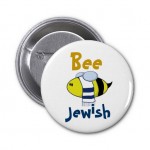 The first time my husband and I (both middle aged) gazed at the photograph we’d been sent of the black haired, ten-day-old baby girl who we were in the process of adopting from Guatemala, we instantly fell head over heels in love with her. And we knew we wanted to raise her to be Jewish, something neither of us had predicted.
The first time my husband and I (both middle aged) gazed at the photograph we’d been sent of the black haired, ten-day-old baby girl who we were in the process of adopting from Guatemala, we instantly fell head over heels in love with her. And we knew we wanted to raise her to be Jewish, something neither of us had predicted.
I’d grown up with atheist, left-wing parents, lifelong, fiery champions of the oppressed, via civil rights and union activism. They considered themselves Jewish – and were sensitive to anti-Semitism — but didn’t celebrate or observe any Jewish customs or traditions. When asked directly about their Jewish identities, they declared themselves, “Atheists first, Jews second.”
When I was about eight years old, my father led my friend, David, who was from a religious Jewish family and lived in our Bronx apartment building, to our living room window and commanded, “David, look up there at the clouds and the sky!” Obedient, David looked. “Do you see any sign of God? Well, do you?” Cowed, David shook his head. “That’s because there is no God, David,” my father finished up his talk triumphantly, apparently not bothered by the simplicity of his argument that day. David wisely ran home, and I felt mortified.
As an adult, I followed in my parents’ footsteps (although I never terrorized children at my window), feeling no need for Jewish ritual, ceremony, or community. I “felt” Jewish, because it was in my blood, so to speak, but I rarely gave it more thought than that, other than during the one year I lived in Iowa, when I was questioned often by local Christians about my religion, and when I usually fell short of having informed answers.
But that abruptly changed when, after two decades of a contentedly-child-free-by-choice marriage, my equally secular husband and I had our radical change of heart and became the parents of that beautiful, cinnamon-skinned little girl from Guatemala, whose birth parents – about whom we knew almost nothing – were most likely not Jewish.
We weren’t sure, however, how to raise her as a Jew in a way that reflected who we were. We knew we couldn’t do it alone, but we didn’t feel comfortable in the traditional congregations we went to, as we searched for a “home.” We tried out Reform synagogues, including the one in the West Village known informally as “the gay and lesbian synagogue,” because we thought that despite being heterosexuals, we might fit in among its “alternative” members. But it too felt too traditional for us, not progressive enough. Were we just too old, we wondered, to suddenly “become Jewish?”
Finally, a friend of mine told me she had heard about a congregation that was very progressive, and which we might like. Fortunately — because sometimes it really does “take a village” — we discovered, and joined, a humanistic Jewish congregation in New York City, in whose Kids’ School my daughter has been enrolled since she was two, and where Jewish holidays are celebrated as “cultural expressions” connecting to Jewish history and ethics, to the musical accompaniment of traditional Hebrew melodies, Yiddish folk songs, and American protest music.
We sing “We Shall Overcome,” which harkens back to the civil rights movement, a time when Blacks and Jews worked hand in hand together trying to end racism and racist laws. We also sing “Hayvenu Shalom Aleichem,” a Hebrew song that asks for peace in the world. We discuss historical and contemporary Jewish literature and art, and we learn from the Bible without believing it to be the literal truth. (Still, my late parents would turn over in their graves if they knew I was a member of any organized congregation, and that I’m determined to give my daughter a Bat Mitzvah.)
Although I’m still a long way (if ever) from wanting to host a Seder in my own home, I’m very happy each year to participate in my congregation’s Seder, where the words of the Haggadah written by our Rabbi make overt and specific connections between the historic oppression and liberation of the Jews and the oppression of people all over the world today, and where we partake of a wide variety of delicious Harosets, culled from recipes from all over the globe — and where I am, in so many ways, in my middle age, as much of a newcomer to the poignant and joyous celebration of Judaism as is my now ten-year-old daughter.
Janice Eidus, 50-something, is a novelist, essayist, and short story writer. Twice a winner of the O.Henry Prize and a Pushcart Prize, as well as an Acker Prize, she’s published the novels, The War of the Rosens, The Last Jewish Virgin, Urban Bliss, and Faithful Rebecca. Her story collections include The Celibacy Club and Vito Loves Geraldine. Her work appears in such magazines as The New York Times, Arts & Letters, Lilith, and Jewish Currents, as well as such anthologies as The Oxford Book of Jewish Stories and Desire: Women Write About Wanting. She has lived in The Virgin Islands and Mexico, and currently lives in New York City. She can be found at http://www.janiceeidus.com
